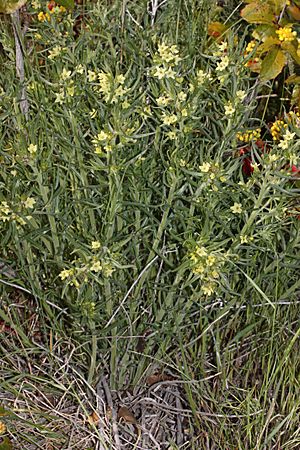Western stoneseed facts for kids
Quick facts for kids Western stoneseed |
|
|---|---|
 |
|
| Lithospermum ruderale in Wenas Wildlife Area, Washington | |
| Scientific classification | |
| Genus: |
Lithospermum
|
| Species: |
ruderale
|
Lithospermum ruderale is a type of flowering plant. It is also known as western stoneseed or lemonweed. This plant belongs to the borage family.
You can find Lithospermum ruderale in western Canada and the western United States. It grows in many different kinds of places.
Contents
What is Western Stoneseed?
This plant is a perennial herb. This means it lives for more than two years. It grows from a thick root called a taproot. It also has a woody base called a caudex.
The plant is covered with fine hairs. These hairs stand up, especially on the stems. It grows a group of straight, leafy stems. These stems can be 20 to 50 centimeters tall.
Leaves and Flowers
The stems have long, narrow leaves. These leaves can be up to 8 centimeters long. Clusters of flowers grow near the top of the stems. Small, leaf-like parts called bracts are found near the flowers.
The flowers are light yellow. Sometimes they look a little green. Each flower is about one centimeter long and wide. The part of the flower called the style is short.
Seeds and Fruit
After the flowers, the plant makes fruit. The fruit is made of one or two, sometimes four, shiny gray nutlets. These nutlets are like small seeds. They are usually 3.5 to 6 millimeters long. Sometimes they can be as long as 8 millimeters.
How Native Americans Used This Plant
Long ago, several Native American groups used this plant. They used it as medicine. For example, the Navajo and Shoshone people used Lithospermum ruderale.
Images for kids
See also
 In Spanish: Lithospermum ruderale para niños
In Spanish: Lithospermum ruderale para niños


